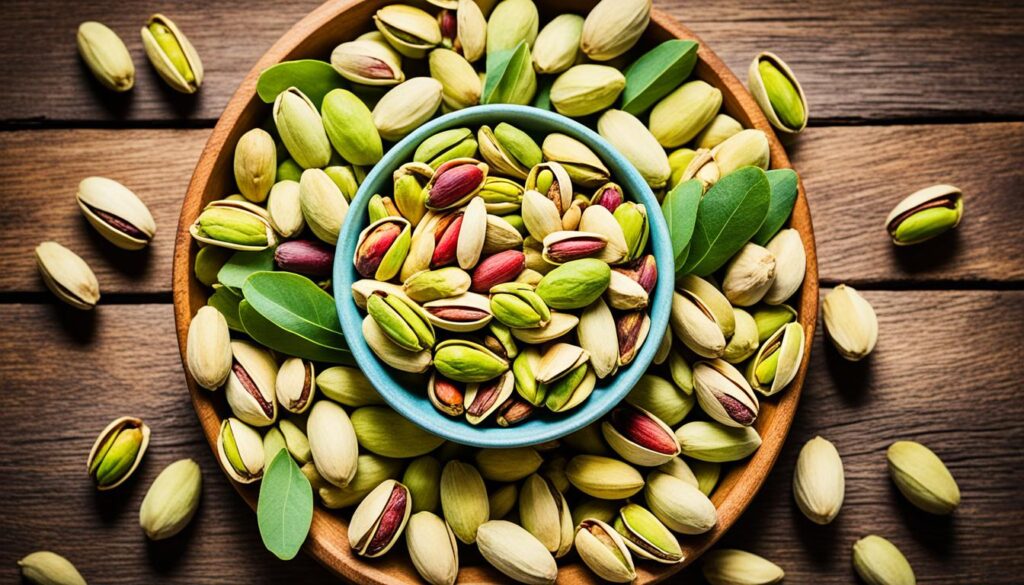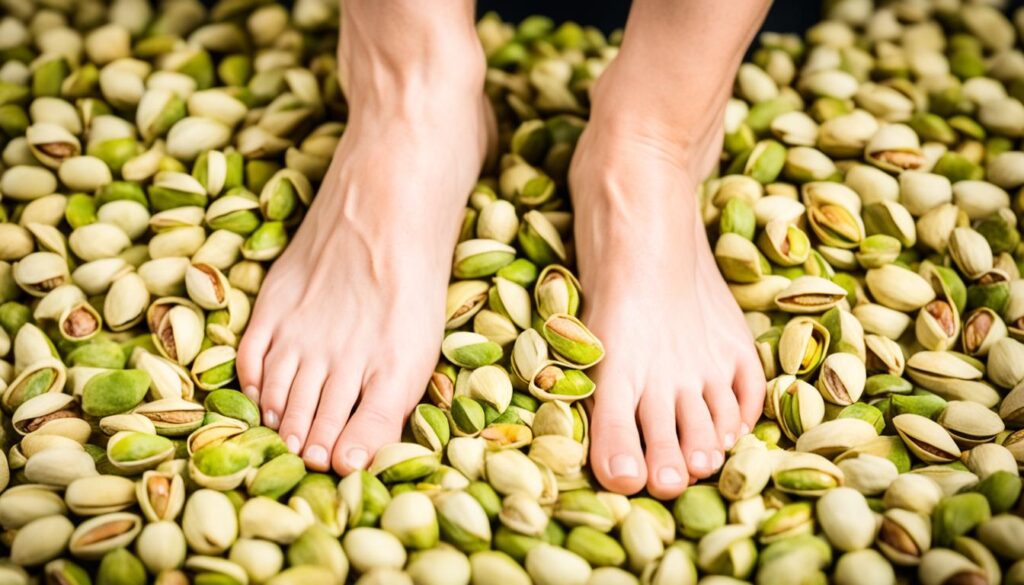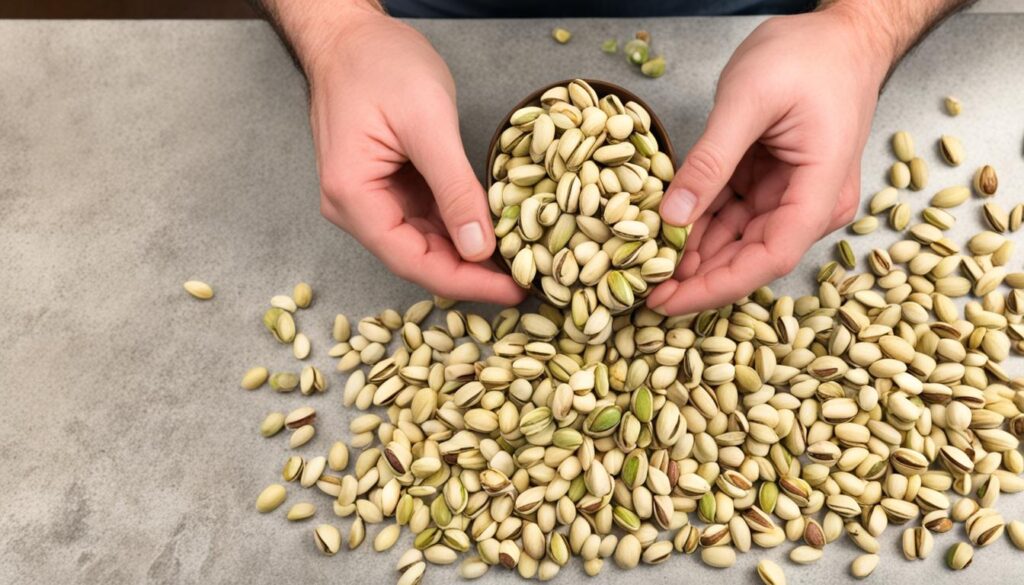Do you know eating too many pistachios side effects on your health? It’s true! While pistachios are a delicious and nutritious snack, eating too many pistachios can lead to various side effects and risks. It’s important to be aware of the potential consequences of pistachio overdose to prevent any harm.
In this article, we will explore the symptoms and health risks associated with pistachio overconsumption, as well as the nutritional profile of pistachios and their benefits and side effects. We will also dive into the impact of excessive pistachio intake on heart health, weight management, and allergies. Finally, we will provide insights into the safe consumption of pistachios and offer key takeaways for maintaining a balanced pistachio intake.
Key Takeaways:
- Consuming excessive amounts of pistachios can have negative effects on your health.
- Overeating pistachios can lead to pistachio overdose symptoms and various health risks.
- Pistachios have a unique nutritional profile that offers both benefits and possible side effects.
- Pistachio overconsumption can result in pistachio poisoning symptoms and digestive issues, including diarrhoea.
- Finding the right amount of pistachios to consume is important for weight management and heart health.
Pistachio Overdose Symptoms and Health Risks
Overeating pistachios can lead to pistachio overdose, which can have various symptoms and health risks. It’s important to recognize the signs of overconsumption and understand the potential risks associated with excessive pistachio intake. Additionally, knowing the toxicity levels in nuts can help you gauge your consumption.
Identifying Signs of Pistachio Overconsumption
Eating a large amount of pistachios in a short period can result in symptoms of pistachio overdose. Some common signs that you may have consumed too many pistachios include:
- Stomach pain or discomfort
- Nausea and vomiting
- Diarrhea
- Excessive thirst
- Headaches
If you experience any of these symptoms after consuming a large quantity of pistachios, it’s important to reduce your intake and monitor your symptoms.
Risks of Excessive Pistachio Intake
Consuming excessive amounts of pistachios can pose health risks. Pistachios are high in calories and fat, which can contribute to weight gain if consumed in large quantities. Additionally, pistachios contain a compound called oxalate, which can contribute to the formation of kidney stones in individuals who are prone to them.
Moreover, pistachios are a common allergen, and consuming large quantities can trigger allergic reactions in sensitive individuals. Symptoms of a pistachio allergy may include hives, itching, swelling, and difficulty breathing. If you have a known allergy to pistachios, it’s important to avoid consuming them altogether and seek medical attention if accidentally exposed.
Understanding Toxicity Levels in Nuts
While pistachios are generally safe to consume, it’s important to be aware of the toxicity levels in nuts. Nuts, including pistachios, naturally contain phytic acid and lectins, substances that can be toxic if consumed in large amounts.
However, it’s worth noting that the levels of phytic acid and lectins in pistachios are relatively low compared to other nuts, making them less likely to cause toxicity. Additionally, processing methods such as roasting and boiling can reduce the levels of these compounds in pistachios, making them safer for consumption.
To ensure safe consumption of pistachios and other nuts, it’s recommended to vary your nut intake and not rely solely on one type. This helps minimize the risk of overexposure to any potentially harmful compounds.
| Potential Symptoms of Pistachio Overdose | Risks of Excessive Pistachio Intake | Toxicity Levels in Nuts |
|---|---|---|
|
|
Phytic acid and lectins are present in pistachios, but their levels are relatively low compared to other nuts. Roasting and boiling can further reduce these compounds. |
The Nutritional Profile of Pistachios: Benefits and Side Effects
Pistachios are not only delicious snacks but also offer a unique nutritional profile that provides numerous benefits for our health. Understanding the nutrients present in pistachios can help us make informed decisions about incorporating them into our diet.
So, what makes pistachios a nutritional powerhouse?
First and foremost, pistachios are rich in healthy fats, including monounsaturated and polyunsaturated fats, which are essential for heart health. These fats can help reduce bad cholesterol levels and lower the risk of heart disease.
Pistachios are also an excellent source of protein, providing all nine essential amino acids. This makes them a valuable plant-based protein option for those following a vegetarian or vegan diet.
In addition to fats and protein, pistachios are packed with essential vitamins and minerals. They are a good source of vitamin B6, thiamine, phosphorus, copper, and manganese. These nutrients play vital roles in energy production, brain function, bone health, and antioxidant defense.
The impressive nutritional profile of pistachios also includes dietary fiber. Fiber is essential for healthy digestion, promoting regular bowel movements, and aiding in weight management by increasing satiety.
But what about the potential side effects of consuming pistachios?
While pistachios are generally safe to eat, it’s important to be mindful of potential allergic reactions if you have a nut allergy. Allergic reactions to pistachios can range from mild symptoms like itching and rash to severe reactions that require immediate medical attention.
Furthermore, pistachios are calorie-dense, so it’s important to practice portion control. Consuming large quantities of pistachios can contribute to weight gain, especially if they are added to an already calorie-rich diet.
Finally, keep in mind that pistachios are high in oxalates, which can contribute to the formation of kidney stones in susceptible individuals. If you have a history of kidney stones or are at an increased risk, it’s advisable to limit your intake of pistachios.

| Nutrient | Amount per 100g |
|---|---|
| Energy | 562 calories |
| Protein | 20.3g |
| Fat | 45.3g |
| Carbohydrate | 27.2g |
| Fiber | 10.3g |
| Sugar | 7.7g |
| Vitamin B6 | 1.7mg |
| Thiamine | 0.8mg |
| Phosphorus | 490mg |
| Copper | 1.3mg |
| Manganese | 1.2mg |
With their impressive nutritional profile, pistachios offer numerous benefits for our overall health. However, it’s essential to consume them in moderation and be mindful of any potential allergic reactions or health conditions that may require dietary restrictions.
Eating Too Many Pistachios Side Effects
Consuming excessive amounts of pistachios can have negative consequences for your health. It’s important to be mindful of the potential side effects that can arise from eating too many pistachios. When nutritional benefits turn negative, it’s crucial to be aware of the symptoms that may indicate pistachio poisoning. In this section, we will explore the side effects of overconsumption, the symptoms of pistachio poisoning to watch for, and the potential link between excessive pistachio intake and diarrhoea.
Pistachio Poisoning Symptoms to Watch For
When you consume an excessive amount of pistachios, you may experience symptoms that indicate pistachio poisoning. These symptoms can include:
- Stomach pain and discomfort
- Diarrhea
- Nausea and vomiting
- Headaches
- Allergic reactions, such as itching or swelling
If you experience any of these symptoms after eating a large quantity of pistachios, it’s important to seek medical attention to ensure your well-being.
Can Eating Too Many Pistachios Cause Diarrhea?
Diarrhea is a common side effect of overeating pistachios. This can be attributed to the high fiber content of pistachios, which can cause digestive discomfort and loose stools when consumed in excess. While pistachios are a good source of dietary fiber, consuming too much can lead to gastrointestinal distress, including diarrhea.
It’s important to listen to your body and pay attention to how it reacts to your pistachio consumption. If you notice that eating a large number of pistachios consistently causes diarrhoea, it’s advisable to reduce your intake to avoid further digestive issues.
When Nutritional Benefits Turn Negative
Although pistachios offer numerous nutritional benefits, it’s essential to consume them in moderation. When you exceed the recommended portion size and eat too many pistachios, the nutritional benefits can turn negative. Excessive consumption can lead to weight gain, an imbalance in nutrient intake, and potential health issues associated with overconsumption.
It’s crucial to strike a balance and incorporate pistachios into a well-rounded diet rather than relying on them as a sole source of nutrition. Moderation is key to enjoying the nutritional benefits of pistachios while avoiding the negative consequences of overconsumption.

| Side Effects of Eating Too Many Pistachios | Symptoms of Pistachio Poisoning | Can Eating Too Many Pistachios Cause Diarrhea? | When Nutritional Benefits Turn Negative |
|---|---|---|---|
| Stomach pain and discomfort | Stomach pain and discomfort | Diarrhea | Weight gain |
| Diarrhea | Diarrhea | Nausea and vomiting | Imbalance in nutrient intake |
| Nausea and vomiting | Nausea and vomiting | Headaches | Potential health issues associated with overconsumption |
| Headaches | Allergic reactions, such as itching or swelling | ||
| Allergic reactions, such as itching or swelling |
Safe Pistachio Consumption: How Many is Too Many?
Finding the right amount of pistachios to consume is crucial for enjoying their benefits without experiencing any negative side effects. It is important to be mindful of your pistachio intake to maintain a healthy balance. So, how many pistachios should you eat in a day?
To determine the safe consumption of pistachios, it is recommended to consider factors such as age, overall health, and individual dietary requirements. However, as a general guideline, consuming about 1 to 1.5 ounces (30-45 grams) of pistachios per day is considered safe and beneficial for most adults.

Why is this amount considered safe? Pistachios are nutrient-dense and contain various beneficial components such as healthy fats, fiber, protein, vitamins, and minerals. However, they also contain calories, so moderation is key to prevent excessive calorie intake.
By limiting your pistachio consumption to the recommended amount, you can enjoy their nutritional value while controlling your calorie intake. This balance is essential to support overall health and well-being.
Remember to consider the context of your overall diet and lifestyle when determining the appropriate amount of pistachios for you. If you have specific dietary concerns or health conditions, it is advisable to consult with a healthcare professional or registered dietitian for personalized guidance.
Benefits of safe pistachio consumption:
- Rich in heart-healthy monounsaturated fats
- Good source of dietary fiber
- Contains essential vitamins and minerals
- May aid in weight management
- May contribute to improved blood sugar control
Enjoy pistachios as part of a balanced diet, and savor their delicious taste and health benefits while practicing moderation.
| Factors to Consider | Recommendation |
|---|---|
| General Population | 1 to 1.5 ounces (30-45 grams) per day |
| Specific Dietary Needs or Health Conditions | Consult a healthcare professional or registered dietitian |
Pistachio Allergies and Food Sensitivities
While pistachios are a popular and nutritious snack, it’s important to note that some individuals may have allergies or sensitivities to these nuts. Understanding the common allergic reactions to pistachios and learning how to identify and manage nut allergies is crucial for your well-being. In this section, we will explore the allergic potential of pistachios and provide you with useful information to help you avoid any adverse effects.
Common Allergic Reactions to Pistachios
Allergic reactions to pistachios can vary from mild to severe, with symptoms manifesting shortly after consumption. The most common allergic reactions include:
- Itchy or swollen lips, tongue, or throat
- Hives or rashes on the skin
- Difficulty breathing or shortness of breath
- Wheezing or coughing
- Abdominal pain, nausea, or vomiting
If you experience any of these symptoms after eating pistachios, it’s important to seek medical attention immediately as it may indicate an allergic reaction.
How to Identify and Manage Nut Allergies
If you suspect that you have a nut allergy or have experienced allergic reactions to pistachios in the past, it’s essential to take proactive measures to manage your condition. Here are some steps you can take:
- Consult with a healthcare professional or allergist to get an official diagnosis.
- Avoid consuming pistachios and other nuts that you are allergic to.
- Read food labels carefully to check for potential nut allergens in processed foods.
- Carry an epinephrine auto-injector (such as an EpiPen) if prescribed by your doctor for emergencies.
- Inform your friends, family, and coworkers about your nut allergy so that they can take necessary precautions when preparing food or snacks.
By following these steps and taking necessary precautions, you can effectively manage your nut allergy and reduce the risk of experiencing adverse reactions.

Remember, if you suspect an allergic reaction to pistachios or any other nuts, it’s important to consult with a healthcare professional for proper diagnosis and guidance. Taking the necessary steps to identify and manage your nut allergies will help ensure your safety and well-being.
Heart Health and Pistachios: A Double-Edged Sword
Pistachios have long been touted as heart-healthy snacks, but it’s important to recognize that their impact on cardiovascular health can be both beneficial and potentially risky. Let’s explore the heart health benefits of pistachios as well as the potential risks associated with their consumption.
Heart Health Benefits of Pistachios:
- Pistachios are a good source of healthy fats, including monounsaturated and polyunsaturated fats, which have been linked to improved heart health and reduced risk of heart disease.
- They are also rich in antioxidants, such as lutein and gamma-tocopherol, which can help reduce inflammation and oxidative stress in the body, contributing to better heart health.
- The fiber content in pistachios can help lower cholesterol levels by reducing the absorption of cholesterol from the diet and promoting healthy digestion.
- Research suggests that regular consumption of pistachios as part of a balanced diet may help lower blood pressure and improve the overall function of blood vessels.
Risks of Pistachio Consumption for Heart Health:
- Pistachios are high in calories, and consuming excessive amounts can lead to weight gain, which is a risk factor for heart disease. It’s important to enjoy pistachios in moderation and be mindful of portion sizes.
- Salted or flavored pistachios often contain added sodium, which can increase blood pressure and pose a risk for individuals with hypertension or other cardiovascular conditions. Opting for unsalted or lightly salted varieties is recommended.
- Some individuals may have allergic reactions to pistachios, which can manifest as respiratory symptoms or even anaphylaxis. It’s crucial to be aware of any allergies or sensitivities before incorporating pistachios into your diet.
It’s important to strike a balance when including pistachios in your diet for heart health. Enjoying them as part of a varied and balanced eating plan, alongside other heart-healthy foods, can provide potential benefits while minimizing the risks. As always, consulting with a healthcare professional or registered dietitian is recommended for personalized advice.
Weight Management: Pistachios’ Role in Diet
Pistachios can play a significant role in weight management due to their composition of fats and fibers. Understanding the role of these nutrients in weight loss can help you leverage the benefits of pistachios for your weight management goals.
The Role of Fats and Fibers in Weight Loss
When it comes to weight loss, both fats and fibers play essential roles. Fats are a crucial component of a healthy diet as they provide energy and aid in the absorption of fat-soluble vitamins. However, not all fats are created equal. The monounsaturated and polyunsaturated fats found in pistachios are considered heart-healthy fats that can promote satiety and contribute to weight management.
Fibers, on the other hand, provide bulk to your meals, helping you feel fuller for longer. They also regulate digestion and support healthy gut bacteria. Pistachios, being high in dietary fiber, can help curb your appetite and prevent overeating, making them a valuable addition to a weight-loss diet.
Resisting the Urge to Overindulge
While pistachios can support weight management, it’s essential to resist the urge to overindulge. These nuts are nutrient-dense, meaning they provide a significant amount of calories in a small serving size. Practicing portion control and mindful eating can prevent excessive calorie intake and contribute to successful weight loss.
One effective strategy is to pre-portion your pistachios into small containers or snack bags, making it easier to monitor your intake. This way, you can enjoy the satisfying crunch and flavor of pistachios without jeopardizing your weight management goals.
Moderation as Key to Leveraging Pistachio Benefits
When it comes to pistachios and weight management, moderation is key. Including pistachios as part of a balanced diet that incorporates a variety of nutritious foods can help you achieve a healthy weight and promote overall well-being.
Add pistachios to your meals and snacks, such as sprinkling them over salads, incorporating them into homemade trail mixes, or enjoying them as a standalone snack. However, be mindful of your calorie intake and ensure that pistachios fit within your daily energy requirements.
Conclusion
In conclusion, maintaining a mindful approach to your pistachio consumption is crucial to avoid experiencing any negative side effects. While pistachios offer numerous health benefits, overconsumption can lead to potential risks. By summarizing the impacts of pistachio overconsumption, adopting mindful eating habits, and finding the right balance in your pistachio intake, you can enjoy their nutritional advantages while still maintaining a healthy lifestyle.
Summarizing the Impacts of Pistachio Overconsumption
Excessive pistachio consumption can have adverse effects on your health. It’s important to be mindful of the potential risks associated with overindulging in pistachios, such as pistachio poisoning symptoms and the possibility of experiencing diarrhea. By understanding the signs of overconsumption and knowing the acceptable limits, you can avoid these negative impacts and safeguard your well-being.
Adopting Mindful Eating Habits
Adopting mindful eating habits when it comes to pistachio consumption can help you maintain a balanced diet. By being aware of your serving sizes and listening to your body’s hunger and satiety cues, you can prevent excessive intake. Additionally, practicing portion control and savoring the flavors of each pistachio can enhance your eating experience and promote a healthier relationship with food.
Final Thoughts on Balancing Pistachio Intake
To strike a balance in your pistachio intake, it’s essential to consider the overall context of your diet and individual health needs. While pistachios offer numerous nutritional benefits, they should be consumed as part of a varied and balanced diet. Moderation is key to leveraging the positive impacts of pistachio consumption while avoiding any potential risks associated with overindulgence.
FAQ
What are the side effects of eating too many pistachios?
Consuming excessive amounts of pistachios can lead to side effects such as digestion problems, weight gain, increased sodium intake, and potential allergic reactions.
What are the symptoms and health risks of pistachio overdose?
Pistachio overdose can manifest through symptoms like stomach pain, nausea, vomiting, diarrhea, and in severe cases, potential poisoning. Health risks of excessive pistachio consumption include digestive issues, weight gain, and increased sodium intake.
How can I identify signs of pistachio overconsumption?
Signs of overconsumption may include digestive discomfort, bloating, and bowel irregularities. Pay attention to your body’s response and maintain a balanced intake to prevent any adverse effects.
Are there risks associated with excessive pistachio intake?
Yes, consuming too many pistachios can lead to health risks such as weight gain, digestive problems, and an increased intake of sodium, which may negatively impact your overall well-being.
How can I understand the toxicity levels of nuts, including pistachios?
It’s important to have a general understanding of the toxicity levels in nuts, including pistachios, to gauge your consumption. While pistachios are generally safe, excessive intake can lead to potential poisoning and other health issues.
What is the nutritional profile of pistachios, and what are their benefits and side effects?
Pistachios have a unique nutritional profile, rich in protein, healthy fats, fiber, vitamins, and minerals. They offer benefits such as heart health support and weight management. However, excessive consumption can lead to adverse effects, including weight gain and digestive problems. Moderation is key.
What are the symptoms of pistachio poisoning, and how can it be prevented?
Symptoms of pistachio poisoning may include vomiting, diarrhea, abdominal pain, and in severe cases, difficulty breathing or cardiovascular complications. Prevention can be achieved by consuming pistachios in moderation and being mindful of any potential allergies or sensitivities.
Can eating too many pistachios cause diarrhea?
Yes, excessive pistachio consumption can lead to diarrhea due to the high fiber content present in these nuts. It’s important to maintain a balanced intake and listen to your body’s response to prevent this side effect.
When do the nutritional benefits of pistachios turn negative?
The nutritional benefits of pistachios can turn negative when consumed in excessive amounts. Potential negative effects may include weight gain, digestive problems, and increased sodium intake. It’s important to find a balance in pistachio consumption for optimal health.
How many pistachios should I eat in a day?
The recommended daily intake of pistachios varies depending on individual factors. However, a serving size of around 1 ounce (approximately 49 pistachios) is a reasonable guideline for most people. It’s important to consider your overall diet and nutritional needs when determining your pistachio intake.
What are the common allergic reactions to pistachios, and how can I manage nut allergies?
Common allergic reactions to pistachios include itching, hives, swelling, and in severe cases, anaphylaxis. If you suspect an allergy, it’s important to consult with a healthcare professional who can provide proper diagnosis and guidance on managing nut allergies.
What are the benefits and risks of consuming pistachios for heart health?
Pistachios can have both positive and negative impacts on heart health. While they contain beneficial nutrients like healthy fats and antioxidants, excessive intake can lead to weight gain and increased sodium intake, which may negatively affect cardiovascular health. Moderation and balance are key.
Do pistachios play a role in weight management, and how can I leverage their benefits?
Pistachios can be a helpful tool in weight management due to their composition of healthy fats, protein, and fiber, which can promote satiety and aid in portion control. However, it’s important to practice moderation, resist overindulgence, and incorporate pistachios as part of a balanced diet and lifestyle.
How can I balance my pistachio intake and avoid overconsumption?
To maintain a balanced pistachio intake, it’s essential to be mindful of portion sizes and listen to your body’s signals of satiety. Incorporating them as part of a varied and balanced diet, along with practicing mindful eating habits, will help you enjoy their benefits while avoiding overeating.




